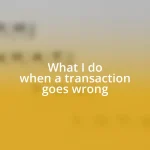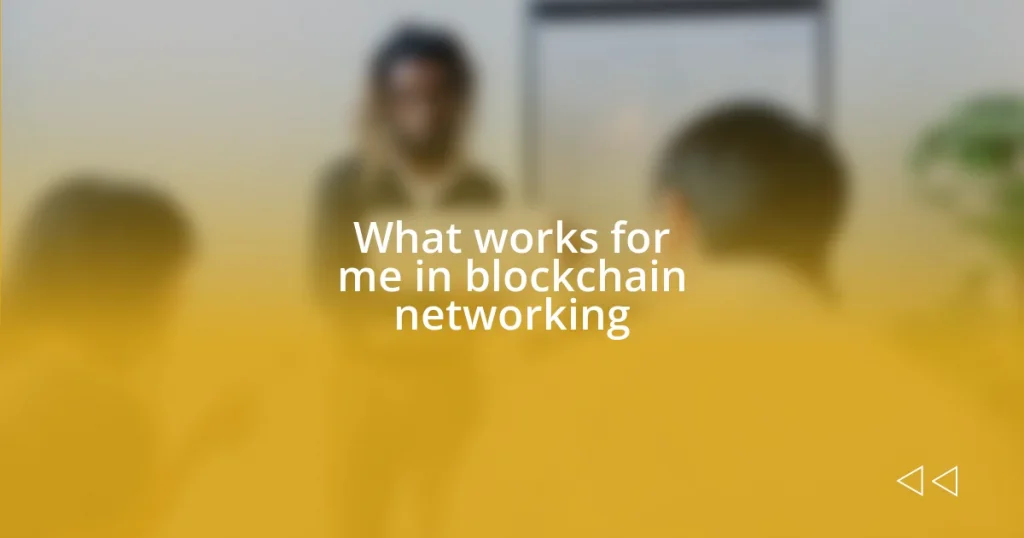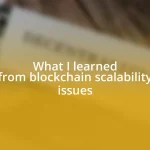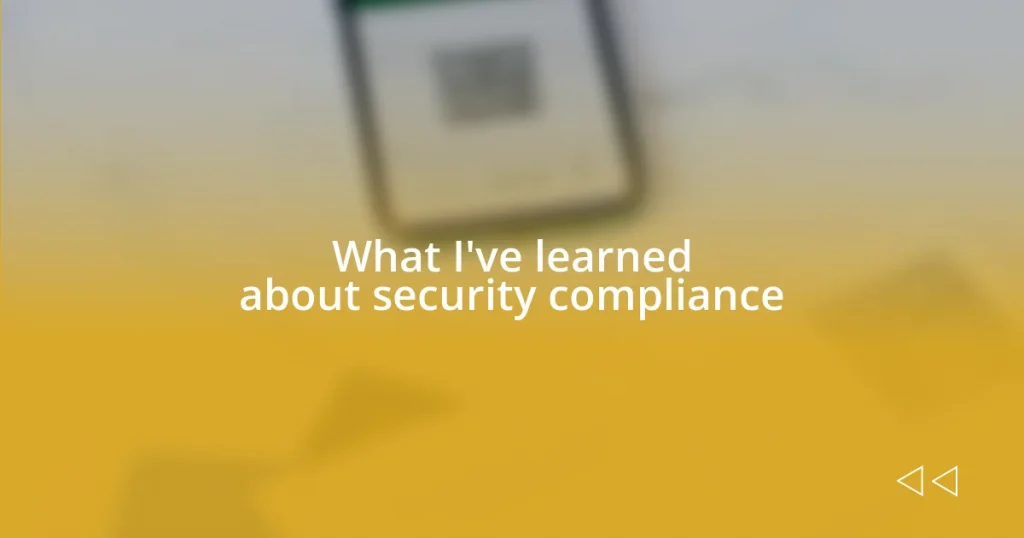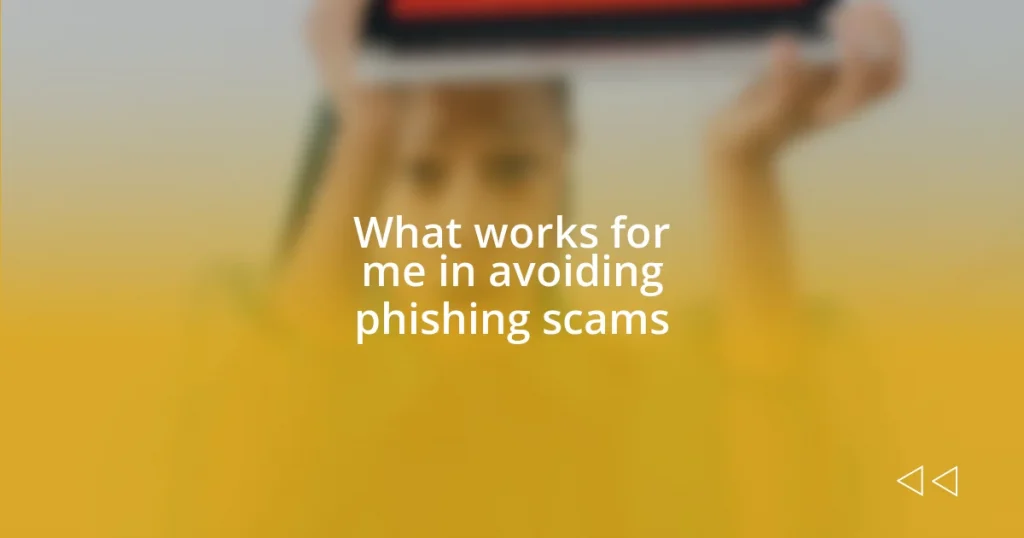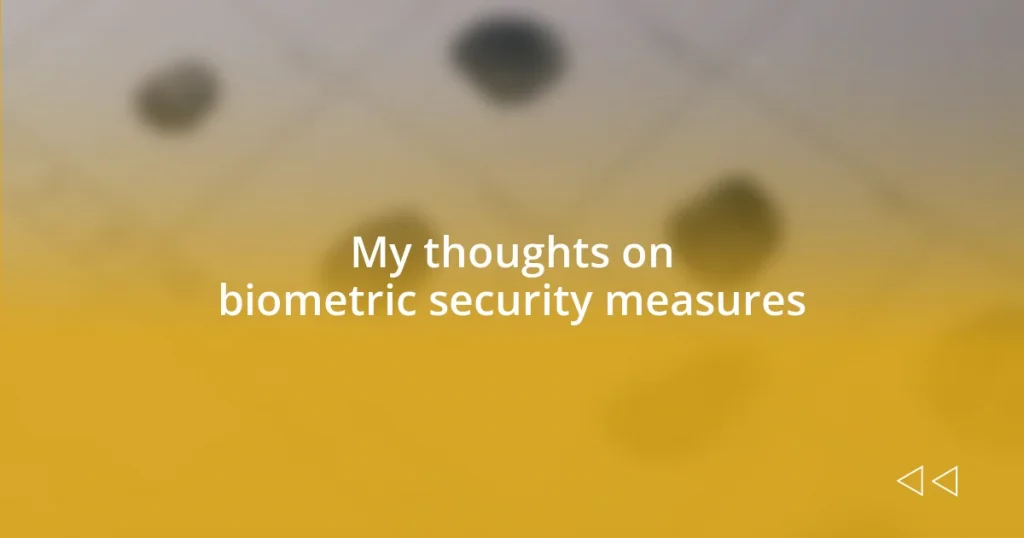Key takeaways:
- Blockchain networking promotes decentralization, fostering collaboration and trust by eliminating intermediaries.
- Key benefits include enhanced security through cryptography, improved efficiency by streamlining transactions, and potential for innovation across various sectors.
- Building valuable connections relies on genuine interest, transparency about challenges, and shared experiences through events and workshops.
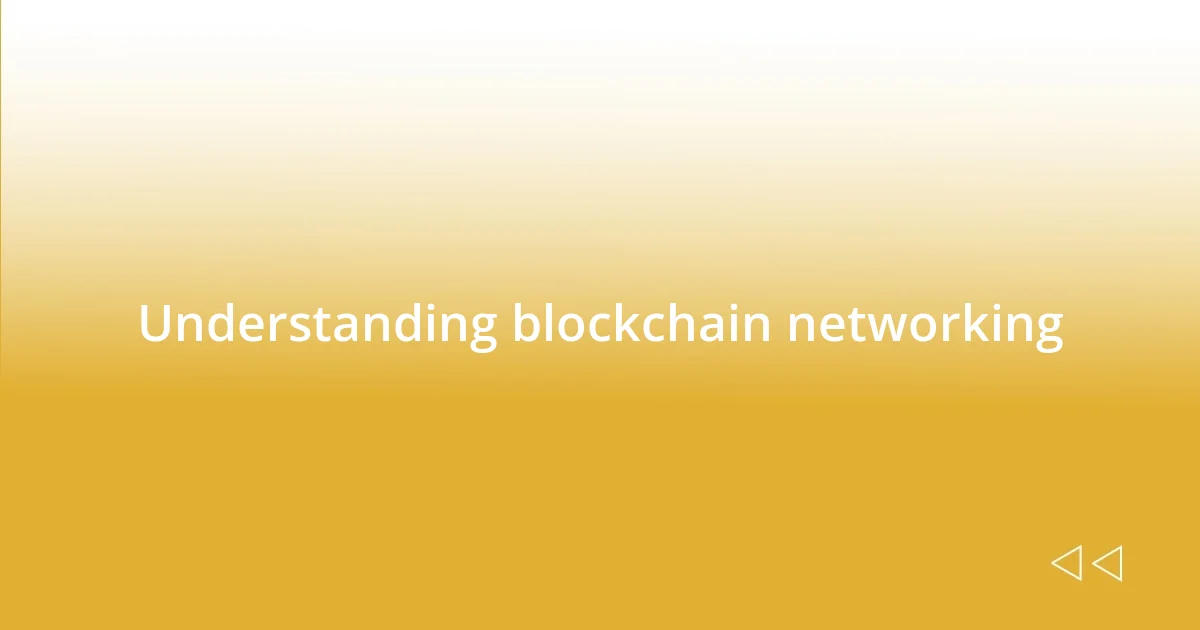
Understanding blockchain networking
Blockchain networking can feel complex at first glance, but the underlying mechanics are quite straightforward. Imagine a digital ledger, where every transaction is securely recorded and visible to all participants. This transparency fosters trust, which is essential in networking, wouldn’t you agree?
When I first dove into blockchain, I found the concept of decentralized control fascinating. I remember the excitement of realizing that no single entity dictates the network, creating a landscape where collaboration thrives. It’s like being part of a community where everyone’s voice matters, and contributions are valued equally.
I often find myself reflecting on how blockchain networking challenges traditional notions of communication. Think about it: how often do we rely on intermediaries in our daily interactions? With blockchain, those barriers dissolve, opening up a world of direct connections and peer-to-peer exchanges. It makes me wonder—what possibilities await us as we continue to explore this technology?

Key benefits of blockchain networking
Blockchain networking offers an unparalleled level of security and privacy that is hard to match in traditional frameworks. In my experience, the cryptographic techniques used in blockchain create a robust shield around sensitive data, allowing parties to engage without constantly fearing data breaches or unauthorized access. I’ve often felt at ease knowing that each transaction I participate in is securely encrypted and documented, giving me the confidence to explore new business opportunities.
Furthermore, the enhanced efficiency that blockchain networking brings to collaboration is something I truly appreciate. The elimination of intermediaries accelerates processes, reducing the time and cost associated with transactions. When I worked on a project leveraging blockchain for supply chain management, I was amazed at how quickly we could verify product authenticity and streamline communication between partners—every step was recorded in the chain, making disputes a thing of the past.
Lastly, the potential for innovation with blockchain networking is simply exciting. The decentralized nature of this technology encourages the development of novel applications across industries. For instance, I once attended a workshop where startups showcased their ideas on using blockchain in healthcare. It was inspiring to see so many creative minds envisioning how we could revolutionize patient data management and healthcare services, ultimately benefiting society.
| Benefit | Description |
|---|---|
| Security | Utilizes cryptographic techniques to ensure data integrity and protection against breaches. |
| Efficiency | Streamlines transactions by removing intermediaries, saving time and reducing costs. |
| Innovation | Encourages the development of new applications across various sectors. |

Choosing the right blockchain platform
When it comes to selecting the right blockchain platform, I’ve learned that it’s essential to align your project’s specific needs with the platform’s capabilities. In my journey, I remember grappling with the choices available—each option had unique features that could either propel my project forward or hamper its progress. Ensuring scalability and compatibility with existing systems was paramount, as I often felt overwhelmed, but ultimately, the clarity I gained from thorough research paid off.
Some key factors to consider include:
- Scalability: Can the platform handle growth as your needs evolve?
- Transaction Speed: How quickly can transactions be processed?
- Developer Community: Is there an active community for support and collaboration?
- Consensus Mechanism: What method does the platform use to validate transactions (e.g., Proof of Work, Proof of Stake)?
- Cost: What are the expenses associated with using the platform, including transaction fees?
Choosing a blockchain platform is not just a technical decision; it’s also about trusting the community and the infrastructure behind it. I recall a specific instance when I was exploring different platforms and stumbled upon a less popular one that had incredible support for developers—what a game-changer that turned out to be! It felt reassuring to know I wasn’t just purchasing a service, but joining a passionate community determined to innovate together.

Effective networking strategies for blockchain
To effectively network within the blockchain ecosystem, I’ve found that attending industry events is invaluable. I remember my first conference; I was initially overwhelmed by the number of people, but every conversation felt like a new door opening. Engaging with professionals—from developers to entrepreneurs—provided me with insights that couldn’t be found online. It made me realize that face-to-face interactions can foster genuine connections that often lead to collaborations.
Another strategy that has worked wonders for me is leveraging online communities and forums. Platforms like Discord or Reddit have become my go-to spaces for discussing ideas and troubleshooting issues. I recall a time when I was stuck on a smart contract issue. I posed my question in a forum, and within hours, several experts chimed in with constructive feedback. This not only resolved my problem but also helped me build relationships with individuals who share my passion for blockchain.
Lastly, sharing knowledge has significantly amplified my networking efforts. I make it a point to write about my experiences and lessons learned on social media and professional networks. Each post becomes a conversation starter, attracting like-minded individuals. I remember posting about a recent project, and it led to a profound discussion with a fellow blockchain enthusiast who ultimately became a collaborator. It’s incredible how sharing your journey can open up opportunities you never anticipated!

Building valuable connections in blockchain
Building valuable connections in the blockchain space starts with a genuine interest in others. One time, during a virtual meetup, I was chatting with a developer about their project and noticed their enthusiasm was contagious. I asked follow-up questions, and that open dialogue led us to explore common interests and eventually collaborate on a side project. Isn’t it amazing how a simple conversation can evolve into something more substantial?
I also find that being transparent about my challenges fosters trust. Once, I shared my struggles with a blockchain integration in a group chat, and instead of judgment, I received a barrage of support and suggestions. This vulnerability not only helped me find solutions but also strengthened my connections with other members who saw me as more than just another networker—they saw me as a fellow traveler on this journey. Have you ever noticed how being open about struggles can connect you with people in ways that surface-level conversations just can’t?
Moreover, attending workshops is another method I cherish for deepening relationships. I remember signing up for a hands-on session about decentralized finance (DeFi). It wasn’t just about learning; the collaborative atmosphere allowed me to team up with others to solve real-world problems. Those team dynamics helped forge bonds that often transitioned to discussions outside the workshop. Isn’t it fascinating how shared experiences can lay the foundation for lasting networks?

Measuring success in blockchain networking
To effectively measure success in blockchain networking, I often look to the quality of connections rather than just the quantity. For me, it’s not about how many people I know, but how many of these connections evolve into meaningful exchanges or collaborations. I remember celebrating a milestone where a casual acquaintance transformed into a reliable partner on a project. Reflecting on that experience, I’ve realized that these deeper relationships often yield greater returns.
Another important metric is the value derived from these interactions. I track how many insights or innovative ideas I’ve gained from my network meetings and discussions. Once, while brainstorming with a group, a suggestion about implementing a specific blockchain solution sparked an idea that led to a successful product launch. It made me wonder—how often do we overlook the potential impact of a single conversation?
Lastly, I consider feedback from peers as a crucial indicator of my networking success. When someone reaches out with praise for a project or asks for guidance based on my experiences, it feels like validation. There was a time when a workshop participant credited me for helping them grasp a complex concept, and that moment truly highlighted the importance of sharing knowledge within the community. Isn’t it rewarding to know you’ve made a real difference in someone else’s journey?





